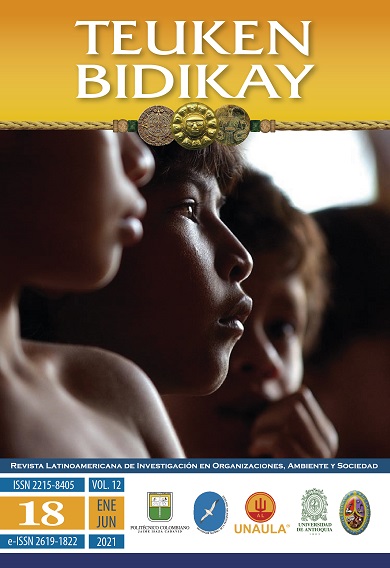Patrones culturales y decisiones de inversión en América Latina. Índices de Hofstede, religión y percepción de la corrupción.
DOI:
https://doi.org/10.33571/teuken.v12n18a5Palabras clave:
inversión fija, expectativas, cultura, índices de Hofstede, América LatinaResumen
Esta investigación busca demostrar que las decisiones de inversión fija en América Latina están determinadas no solo por los fundamentales macroeconómicos (ingreso y tasa de interés), sino también por las expectativas y los patrones culturales. Para definir los patrones culturales, se emplean las dimensiones propuestas por Hofstede, los índices de diversidad religiosa y de percepción de la corrupción. A partir de un modelo de panel de datos para siete países latinoamericanos, se muestra que todas las variables, a excepción del índice de masculinidad, son significativas para explicar la inversión fija en la región. Los resultados demuestran que, para fomentar la inversión, además de promover un ambiente de negocios estable, debe contemplarse el comportamiento y las preferencias de los individuos a partir de su perfil cultural.
Métricas de artículo
Resumen: 944 PDF: 371Métricas PlumX
Citas
Bhardwaj, A.; Dietz, J. & Beamish, P. W. (2007). Host country cultural influences on foreign direct investment. Management International Review, 47(1), 29–50.
Comisión Económica para América Latina [CEPAL]. (2017). Databases and Statistical Publications: CEPALSTAT.http://estadisticas.cepal.org/cepalstat/portada.html?idioma=spanish
Comisión Económica para América Latina [CEPAL]. (2018). Boletín Estadístico # 30 - Comercio exterior de bienes en América Latina y el Caribe - Cuarto Trimestre de 2017. División de Comercio Internacional e Integración. https://repositorio.cepal.org/bitstream/handle/11362/43645/1/Boletin_estadistico_30_es.pdf
Chen, Y.; Dou, P. Y.; Rhee, S. G.; Truong, C. & Veeraraghavan, M. (2015). National culture and corporate cash holdings around the world. Journal of Banking & Finance, 50, 1-18.
Chenery, H. B. (1952). Overcapacity and the acceleration principle. Econometrica: Journal of the Econometric Society, 20(1), 1–28.
Clark, J. M. (1917). Business acceleration and the law of demand: A technical factor in economic cycles. Journal of political economy, 25(3), 217–235.
Cornwall, J. (1970). The Role of Demand and Investment in Long-Term Growth. The Quarterly Journal of Economics, 84(1), 48–69.
De Bondt, G. & Diron, M. (2008). Investment, financing constraints and profit expectations: new macro evidence. Applied Economics Letters, 15(8), 577–581.
Douglas Beets, S. (2007). Global corruption and religion: an empirical examination. Journal of Global Ethics, 3(1), 69-85.
Drabek, Z., & Payne, W. (2002). The impact of transparency on foreign direct investment. Journal of Economic Integration, 17(4), 777-810.
Erdogan, B. (2015). The role of uncertainty avoidance in foreign investment Bias [conferencia]. Conferencia anual de la Asociación de Política Social: desarrollo económico –teoría y política–. Sesión: Expectativas e Incerticumbre. Alemania. https://www.econstor.eu/bitstream/10419/113181/1/VfS_2015_pid_677.pdf
Fisher, I. (1930). The Theory of Interest: as determined by impatience to spend income and opportunity to invest it. The Macmillan Company.
Greenwood, R., & Shleifer, A. (2014). Expectations of returns and expected returns. The Review of Financial Studies, 27(3), 714-746.
Guiso, L., Sapienza, P., & Zingales, L. (2006). Does culture affect economic outcomes?. Journal of Economic perspectives, 20(2), 23–48.
Habib, M., & Zurawicki, L. (2002). Corruption and foreign direct investment. Journal of international business studies, 33(2), 291-307.
Hall, E.T. (1976). Beyond Culture. Garden City.
Hicks, J. (1937). Mr. Keynes and the “Classics”: A Suggested Interpretation. Econometrica, 5(2), 147–159.
Hofstede, G. H.; Hofstede, G. J., & Minkov, M. (2010). Cultures and organizations: Software of the mind (3rd ed.). McGraw-Hill.
Husted, B. W. (2002). Culture and international anti-corruption agreements in Latin America. Journal of Business Ethics, 37(4), 413-422.
Jorgenson, D. W. (1963). Capital theory and investment behavior. The American Economic Review, 53(2), 247–259.
Kashefi-Pour, E.; Amini, S. & Duxbury, D. (2016, febrero 25). The Investment Cash Flow Relationship: Does National Culture Matter? Disponible en SSRN: https://papers.ssrn.com/sol3/papers.cfm?abstract_id=2520059
Keynes, J. M. (1936). The General Theory of Employment, Interest, and Money. Palgrave Macmillan.
Lanzilotta, B. (2014). Expectativas y decisiones empresariales: implicaciones macroeconómicas para Uruguay. Investigación económica, 73(287), 61–88. http://dx.doi.org/10.1016/S0185-1667(14)72607-4
Mauro, P. (1995). Corruption and growth. The quarterly journal of economics, 110(3), 681-712.
Mulholland, J. (1991). The language of negotiation: A handbook of practical strategies for improving communication (1st ed.) Routledge.
OECD. (2017). Organisation for Economic Co-operation and Development: Business confidence index. https://data.oecd.org/leadind/business-confidence-index-bci.htm
Ogliastri, E.; McMillen, C.; Arias, M. E.; Dávila, C.; Dorfman, P.; Fimmen, C., y Martínez, S. (1999). Cultura y liderazgo organizacional en 10 países de América Latina. El estudio Globe. Academia. Revista Latinoamericana de Administración, (22), 29-57.
Pew Research Center. (2014). Table: Religious Diversity Index Scores by Country. http://www.pewforum.org/2014/04/04/religious-diversity-index-scores-by-country/
Power, D.; Schoenherr, T., & Samson, D. (2010). The cultural characteristic of individualism/collectivism: A comparative study of implications for investment in operations between emerging Asian and industrialized Western countries. Journal of Operations Management, 28(3), 206–222.
Ratliff, W. (1999). Development and civil society in Latin America and Asia. The ANNALS of the American Academy of Political and Social Science, 565(1), 91-112.
Rose-Ackerman, S. (1996). The Political Economy of Corruption: Causes and Consequences. World Bank. Washington DC. Viewpoint, 74. https://openknowledge.worldbank.org/handle/10986/11629
Shao, L., Kwok, C. C. & Zhang, R. (2013). National culture and corporate investment. Journal of International Business Studies, 44(7), 745–763.
Shleifer, A. & Vishny, R. W. (1993). Corruption. The quarterly journal of economics, 108(3), 599-617.
Smith, A. (1776). An inquiry into the wealth of nations. Strahan and Cadell.
Solow, R. M. (1956). A contribution to the theory of economic growth. The quarterly journal of economics, 70(1), 65–94.
Tanzi, V. & Davoodi, H. (1998). Corruption, public investment, and growth. (pp. 41-60). In The welfare state, public investment, and growth. Springer.
Transparencia Internacional. (2017). Corruption Perception Index. https://www.transparency.org/country/
Trompenaars, F. & Hampden-Turner, C. (2000). Riding the Waves of Culture: Understanding Cultural Diversity in Business. Nicholas Brealey Publishing.
Varsakelis, N. C. (2001). The impact of patent protection, economy openness and national culture on R&D investment: a cross-country empirical investigation. Research policy, 30(7), 1059-1068.
Voyer, P. A. & Beamish, P. W. (2004). The effect of corruption on Japanese foreign direct investment. Journal of Business Ethics, 50(3), 211-224.
Zubieta, E.; Fernández, I.; Vergara, A.; Martínez, M. D. y Candia, L. (1998). Cultura y emoción en América. Boletín de Psicología, (61), 65-89.
Descargas
Publicado
Cómo citar
Número
Sección
Licencia
Derechos de autor 2021 Karla Meneses, Gabriela Córdova, Bernarda Acosta

Esta obra está bajo una licencia internacional Creative Commons Atribución-NoComercial-CompartirIgual 4.0.


























